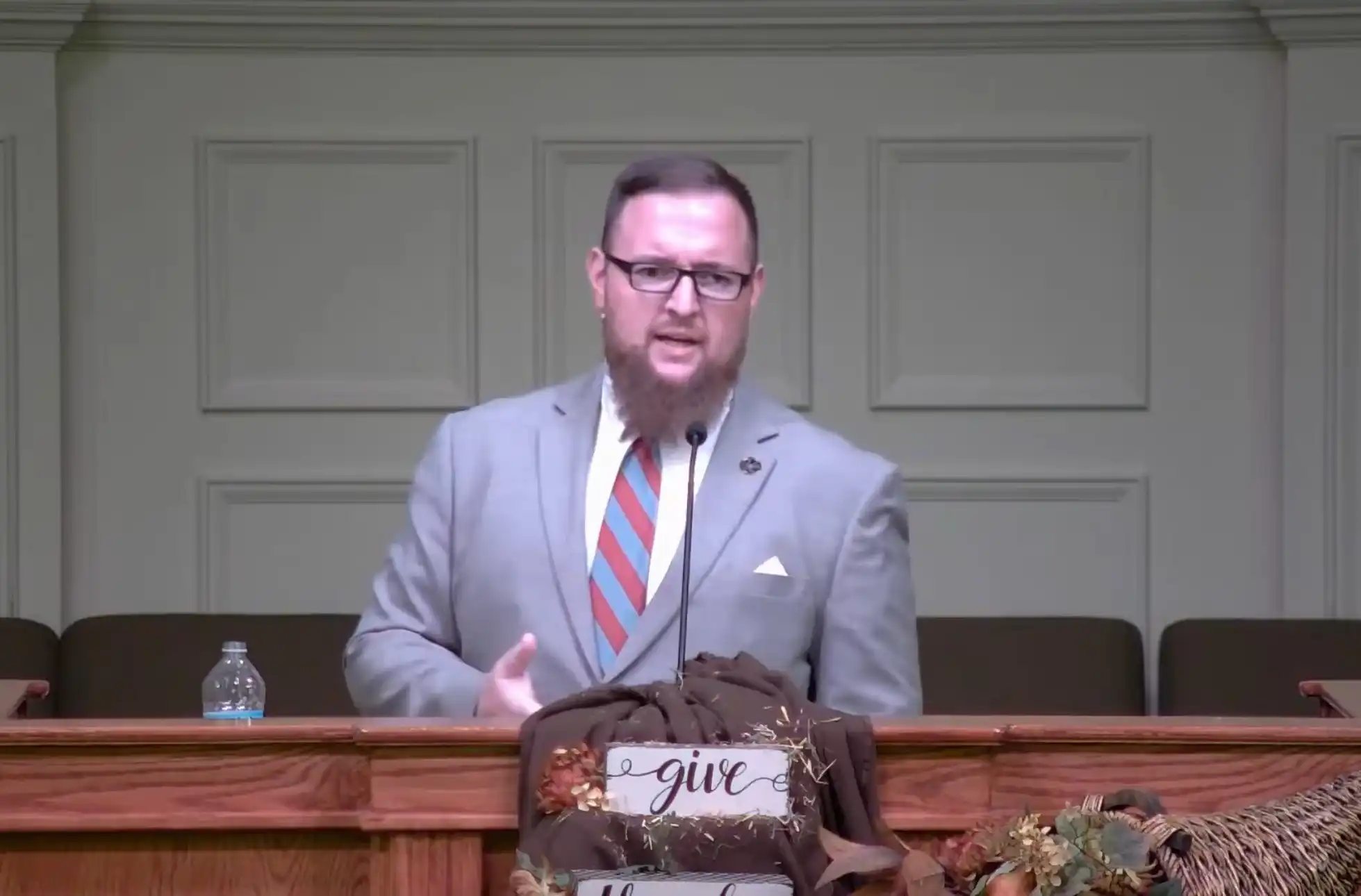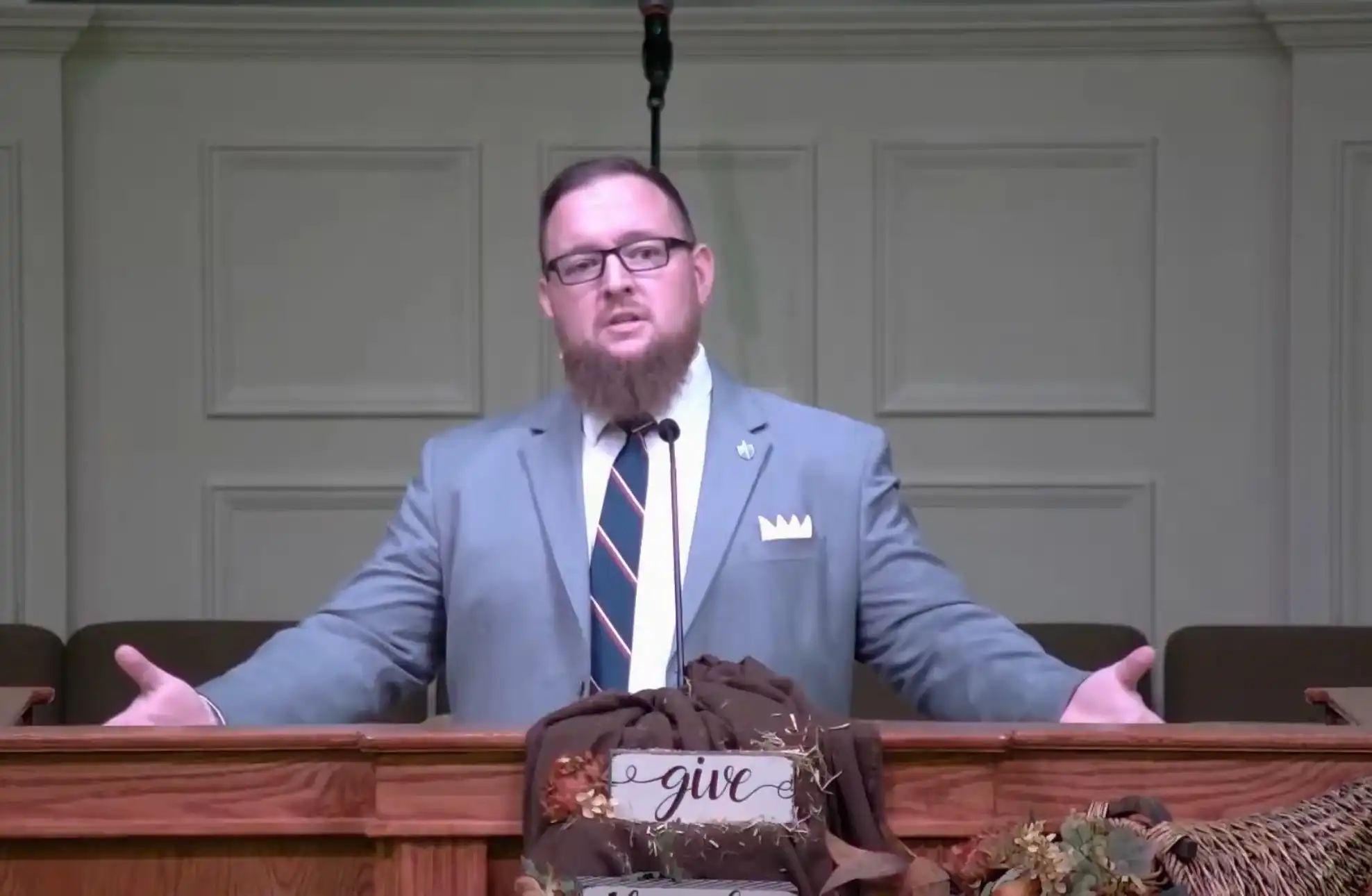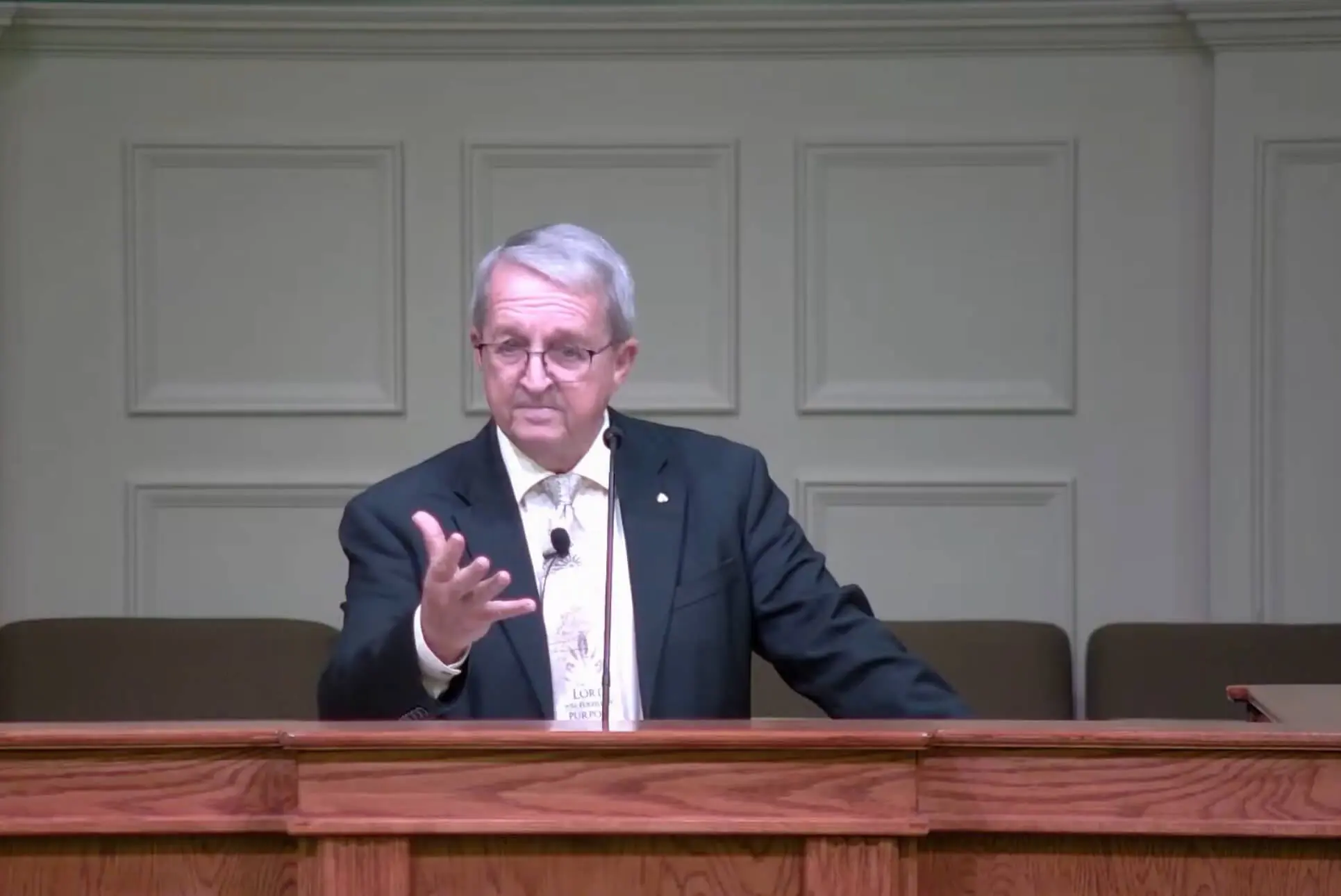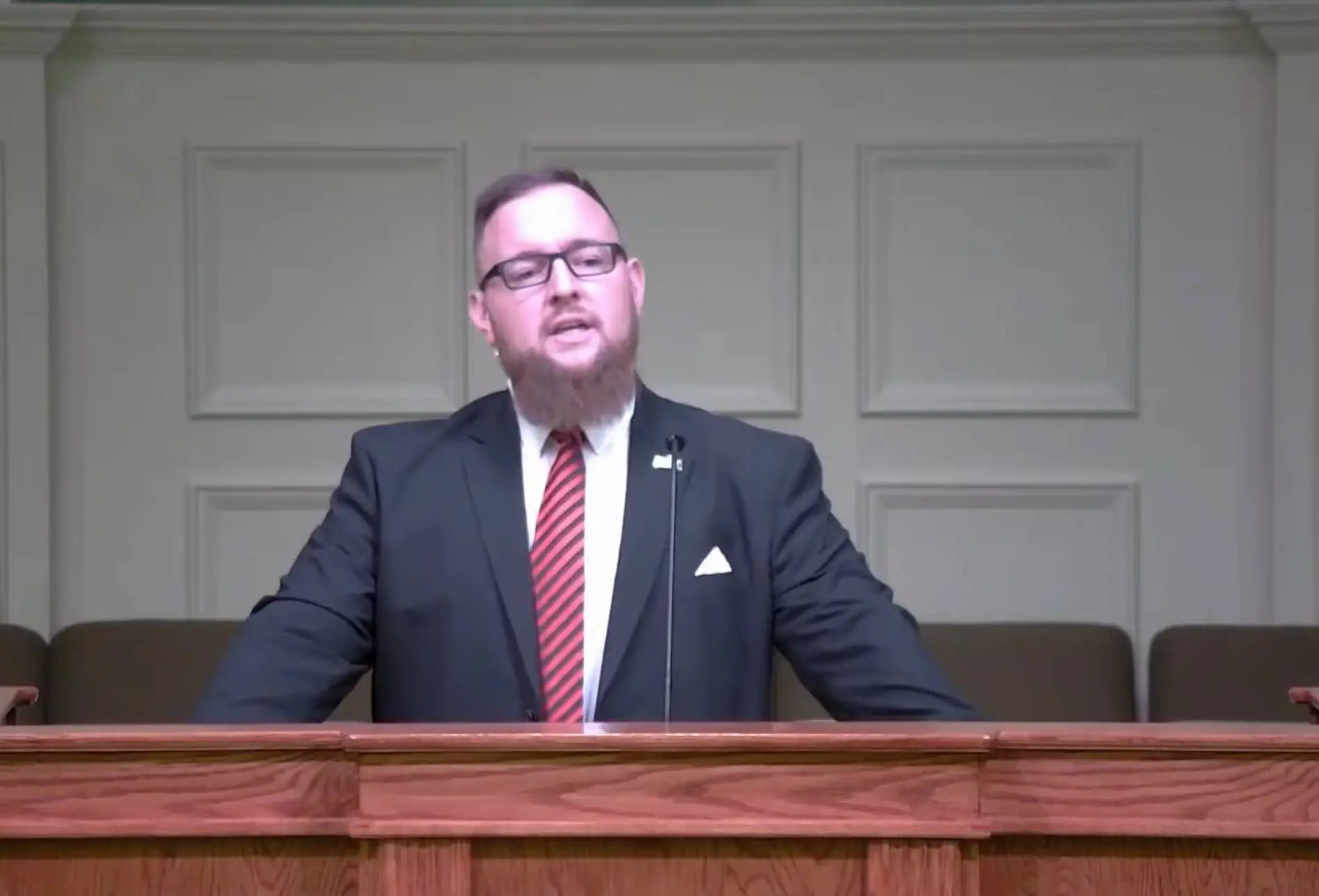Video
“The Begottenness of the Son”
John 3:16-21
Pastor Ryan J. McKeen
09/21/2025
Audio
Transcript
Well, turn with me in your Bibles to John chapter 3. John chapter 3.
We are continuing in our Son of God series today. You all that were here were given a kind of a insert in your bulletin that showed you the different sermons that we will cover and the different passages that we will cover. Actually, I think there’s a few more of those out in the foyer if you are able to grab one of those. And you’ve seen really the direction that we’re heading with this series that really looks at how John uses the name the Son of God. In John’s gospel, he uses that name nine different times. and each one of them builds an understanding of who Jesus truly is.
We’ve seen already, first of all, the expectation of the son, that this was not some new idea that God had a son and that he was coming into the world. That was expected. We saw that with John the Baptist as he was telling people, preparing the way, and when Jesus finally came before him, he announced that this is the Son of God. Then last week we saw the knowledge of the Son of God, the knowledge of the Son revealed. As Nathanael came to Jesus and Jesus revealed to him things that he could not have known otherwise. He had more than simply human knowledge. And this is not just a neat thing about the Son of God. this aspect of him that he has omniscience, that he has the knowledge that only God has confirms that he is God, that as the son of God, he is God himself.
So we’ve seen the expectation of the son in John chapter one, and then also in John chapter one, we saw the knowledge of the son. And today in John chapter three, we see the begottenness of the son. I don’t know if begottenness is a word, but we’re going to use it because we’re looking at the fact that John tells us he is the only begotten son of God. Again, this is the third sermon. in this series. Next week, we will begin new material in John chapter 5.
We’ve been walking through the gospel of John through this whole year, and as we came to John chapter 5, we paused to do this series. So here in John chapter 3, we see another passage that we did cover earlier as we were going verse by verse through the gospel. So next week, we come to uncovered material. But before we get there, We need to pause one more time to continue to build this understanding of who the Son of God is, as John reveals him to us.
Again, this is John chapter three, and we’ll be in verses 16 through 21, where John twice uses this phrase, the begotten Son of God, the only begotten Son of God. Or to use a term that theologians use for this doctrine, It’s called the Eternal Generation of the Son. Fancy seminary words there for you, but we’ll break it down a little bit. And again, we’re covering a doctrine that is a little bit difficult to understand sometimes, so we’re going to go a little bit deep today, a little bit deeper than we may typically do.
But as I’m writing my dissertation along with this, part of it is explaining the context you’re in. And what I do explain is that our church is a pretty deep pond and that you guys can swim. And that I’m not afraid to introduce and even explain some deeper doctrines to this congregation because you all have a pretty good understanding. Back when I did the demographic survey last year, for those of you who were here for that, some of the questions included, there was a lot of questions, but some of them included education level of different ones. And I was surprised by the level of education of many of our congregants here in Fellowship.
But at the same time, I’m not surprised because you all are pretty good at keeping me on my toes. You’re pretty sharp and you’re not afraid to come to me with questions and I really appreciate that. Whether you have education or not, you guys are very well informed and very well theologically developed as compared to maybe some other churches or believers in different places. You all are pretty well theologically informed and you know your Bibles. That being said, we’re gonna go a little bit deeper on a doctrine that’s a little harder to understand today. So, I said you can swim. So let’s leave our floaties behind and we’re gonna dive a little deeper today into some theology.
And as always, if you ever have any questions about what I’m explaining or what I’m saying, you can always come to me with your questions, either after this morning or later in the week, whenever it is. I’m always happy to either explain things further or help answer any other questions that might come up for you. So please don’t be afraid to come to me with any questions. But this is a truth of God’s word. And it’s very important for us understanding Christ and understanding the gospel, and we will see that today.
But again, this idea of the begottenness of the Son, or the eternal generation of the Son, it can be a hard thing for our minds to grasp. Because when we think of someone being begotten, when we think of the genealogies in scripture, and so-and-so begat so-and-so, and so-and-so begat so-and-so, That’s what our mind thinks of when we think of being begotten or generation. So we think, well, Jesus is eternal. The Son of God is eternal, so how could he have been begotten? How could he have been born or come to be like we typically think of begottenness? Again, this is a doctrine that challenges our thinking. It helps us to think a little deeper.
In fact, Dr. John MacArthur, he actually changed his position on this doctrine several years back. He used to believe in what is called incarnational sonship. That is to say that Christ became a son when he came as a man. that he took on sonship when he took on humanity, that he wasn’t always a son, but he took that on in his incarnation. And the reason he held to this was to protect, in his mind, what he was thinking, the deity of Christ and the eternality of Christ. And so, as he explains, if you turn with me quickly to Hebrews chapter one, one of the things he explains that was causing him to think that way, is in Hebrews chapter one, you see, speaking of Christ, in Hebrews chapter one, verse five, speaking of the supremacy of Christ, how he is even greater than the angels, because in verse five he says, for to which of the angels did he ever say, you are my son, today I have begotten you? And again, I will be a father to him, and he will be a son to me.
Now these two quotes in Hebrews chapter one, verse five, are quoting the Old Testament. And they’re quoting passages that originally were referring to David. But the author of Hebrews is revealing to us they also refer to Christ. They were also looking forward to the king who would be the son of God. The first quote there in verse five of Hebrews one, is from Psalm 2-7, we looked at that a couple weeks ago. Psalm 2-7 says, I will surely tell of the decree of Yahweh. He said to me, you are my son, today I have begotten you. And then the other one is from Samuel 7-14, speaking of the coronation of David, and it says, speaking of the Davidic covenant, the promise that David will always have a son on the throne. God promises that I will be a father to him and he will be a son to me. And again, the author of Hebrews is telling us, yes, those referred to David, but they more importantly looked forward to Christ. This is speaking of Christ.
And so, speaking of his view on this, John MacArthur explains that, well, he saw that it says, today I have begotten you, so this couldn’t have meant that Christ was always a son because it’s speaking of a day. So there must have been a day where he became a son when he wasn’t before. However, and again, there are still some who see these verses this way, but John MacArthur explains, and there’s an article out there called, if you look up John MacArthur in Eternal Sonship, it’ll show you this, how he explains how his thinking changed on this. And I think he’s come to the right, or he had come to the right conclusion Because he explains that in his understanding, he came to see that these were talking about more than just a singular day when he became a son. The son has always eternally been the son of God. And some of the passages he talks about where his understanding changed is like John 5, where we’ll be next week, where the Jews understand exactly what Jesus means when he says he is the son of God. And he claims equality with God. Again, we’ll get to that next week. But he also explains this.
This is how John MacArthur explains how his understanding of that verse we just looked at had been more accurately informed as he looked at all of scripture. He says this, and I think he’s correct. He says, it is now my conviction that the begetting spoken of in Psalm 2 and Hebrews 1 is not an event that takes place in time. Even though at first glance, scripture seems to employ terminology with temporal tones. Today I have begotten you. But the context of Psalm 2 seems clearly to be a reference to the eternal decree of God. It’s reasonable to conclude that this begetting spoken of is also something that pertains to eternity rather than a point in time. The temporal language should therefore be understood as figurative and not literal. And so it’s a Psalm, so that makes sense. And that’s John MacArthur explaining that, and I think he’s exactly right.
This is speaking of the decree of God, the decree that took place before there even was time, before he created the world. Because the Son has always been the Son. And another passage that helped to inform Dr. MacArthur as he came to a clearer understanding was the passage we’re in today. John chapter three, verses 16 through 21. Again, we covered this more in depth a few months ago, so I will summarize some of it today, but we’re gonna specifically focus on the two places where John speaks of the only begotten Son of God.
Now you know John 3.16. It’s one of the most often quoted and memorized and cherished verses in the Bible. Almost everybody knows John 3.16. However, I think oftentimes the richness of the theology in John 3.16 is misunderstood or missed. When we read this in the context of John’s gospel, we see that this passage, it really offers a pretty thorough but brief summary of God’s love and the mission of the son, what he came for, and then humanity’s response to him and how that affects our eternal destiny. As you know, as we came through this passage, this is set in a particular context and immediately preceding this, Jesus had just had this conversation with Nicodemus. And he told him that he needed to be born again, or born from above. And that he needed to look to the Son of Man who would be lifted up, as Jesus refers back to Moses in Numbers chapter 21, lifting up the serpent in the wilderness. And even so must the Son of Man be lifted up.
And then you see in verses 14 and 15 of chapter three here, this promise that whoever believes may have eternal life. Then that leads to our passage today. Here in our text today, John again uses this name, the Son of God. He uses it for Jesus Christ and shows that he is the one who is begotten of God, but he’s also the one in whom salvation is found. So I’m gonna read our passage here this morning.
Please follow along as I read. John chapter three, verses 16 through 21. This is the word of the Lord. For God so loved the world that he gave his only begotten son, that whoever believes in him shall not perish, but have eternal life. For God did not send the son into the world to judge the world, but that the world might be saved through him. He who believes in him is not judged. He who does not believe has been judged already, because he has not believed in the name of the only begotten Son of God. And this is the judgment, that the light has come into the world, and men loved the darkness rather than the light, for their deeds were evil. For everyone who does evil hates the light and does not come to the light lest his deeds be exposed. But he who practices the truth comes to the light so that his deeds may be manifested as having been done by God.
Again, this third use of the name the Son of God appears in this passage in verse 18. And here John combines it with this idea of being begotten. You see begotten repeated twice here. And as you I’m sure know in scripture, when you see something repeated, it’s like it’s underlined and highlighted. This is the point here. This is what John is explaining to us in these verses. He is the only begotten Son of God. As we came through this passage before, we talked about how here in verse 16, you see a bit of a shift in the language. Verses 1 through 15 of John chapter 3, you see Jesus speaking to Nicodemus and laying it out for him. And he keeps saying, truly, truly, I say to you, truly, truly, I say to you. He’s explaining this theology to Nicodemus. But here in verse 16, you see the language change. And I think, along with several others, I think this is because this is John’s explanation. of what Jesus had just told Nicodemus.
Because you see, all of a sudden, all these verses start to begin with for, which is an explanatory phrase. For God so loved the world. In the previous verses, it spoke of the sun being lifted up as a future event. Even so, must the Son of Man be lifted up as Jesus is explaining to Nicodemus? This is what’s going to happen to the Son of Man. And then in verse 16, it’s speaking of it as a past event, that God loved the world and he sent his son. And again, this phrase only begotten is only used in the Bible by John.
There’s a word, monogenes is the word in Greek, and it’s only ever used by John and he uses it quite a bit, but that’s a John word. And so I think this section is John helping the reader to understand the significance of Jesus’ conversation with Nicodemus. Because here is where you see the gospel laid bare before the reader. Jesus explained to Nicodemus what he needed to do, what needed to happen in him, and John lays it out for us. John lays out exactly what we must believe to be saved.
Again, this verse 16 begins with, for God so loved the world. As we looked at when we studied this verse, this is not using the word so in a type of measurement. God loved the world so much. That’s not what it’s saying. It’s saying, this is how God loved the world. Jesus had just said, the Son of Man must be lifted up. And John says, this is how God loved the world, that the Son of Man came to be lifted up. And reflecting this understanding, you could say, for God loved the world in this way. This is the means by which God loved the world. Or to quote Romans 5:8, this is the way in which God demonstrated his love for us. that He gave His only begotten Son. God’s love is demonstrated in the giving of His Son.
This is the proof of God’s love. And the way John writes this here, the way he’s explaining this, it’s stressing the reality of this gift. This really happened. This is not theoretical. This actually happened. God actually sent His Son. God’s love is not just a theory. It’s demonstrated by what He sacrificed for us. Then we come to the term there, only begotten, there in verse 16. It’s repeated again in verse 18, and we’ll look at a couple other places here in a moment.
We read 1 John 4 earlier. That is really just an explanation of what John says here in John 3. But this term, only begotten, that’s how it’s phrased here in the LSB. Other versions do have it phrased differently, and I’ll explain why here in a moment, but John’s use of this term. really just recently, has become a topic of debate. What does it really mean that he says, only begotten? Is that what should really be there? Is that how it should be translated?
Many English versions have it differently. But if you look at history dating back even as early as the Latin Vulgate, which is one of the earliest translations from the original. And then eventually we got the English versions. But they all had it as only begotten. They explained it as this is what this Greek translates to, is only begotten. And many English versions up until, or I mean since then, have carried that meaning along. However, really in the 20th century, this began to be seen differently, or understood in a different light.
And that’s because the word there is monogenes. And so you have mono, which means only. That kind of makes sense to us in English. But that genes, it can come from a couple different words. It can either come from a word like generate or generation. That’s where we get those words from. Or it can come from the word genus or kind. It can, if you’re a translator and you’re looking at this, you have to decide, is it saying only of its kind or only generator or only begotten? And so translators have decisions to make when they’re looking at the Greek. And it doesn’t just translate right over to English very easily sometimes. They have to try to understand what’s going on here.
And there’s been a lot of scholarship that’s happened even in recent years that have shown that really the transmission of this word follows the familial language, that there’s a father-son relationship being explained here. And every time that this word is used in relation to a family, that it should be translated, only begotten. And there’s a lot of research that goes into that. But I do believe that only begotten is the right translation.
You’ll see in some of your versions like the ESV or some of the other modern versions, it’ll say either the one and only son or the unique son of God. And those things are true. He is the one and only son of God. He is the unique son of God. But I think if we miss the only begotten word that John is using here. We miss a lot of theology he’s trying to show us, and that’s what I want to explain for us this morning. What does it mean that he’s only begotten? He is the only begotten Son of God.
Again, John uses this again in verse 18, again highlighting for us that this is important for us to understand. I explained earlier that this is often referred to as the doctrine of eternal generation. That he is eternally begotten. That’s a technical definition. Then I’ll give you an easier one, so don’t get too intimidated by this. But this is a technical definition of eternal generation. The doctrine of eternal generation of the son teaches that the father eternally communicates the undivided essence or nature to the son without division, change, or temporal succession.
Again, a lot of technical jargon there, but to boil it down, to simplify it for you, being begotten simply means that you have a father. For example, Augustine, the early theologian, he says this, when we say begotten, we mean the same as when we say son. Being son is a consequence of being begotten, and being begotten is implied by being a son.
So, if you really wanna break this down in our thinking, to be a begotten son means that you have a father. That you are fathered by somebody. In the same sense, you can’t be a father without having offspring, right? If you don’t have offspring, you’re not a father. Well, if you’re offspring, if you’re a son, you necessarily have a father. That’s the way that It works, that’s the way our language works. And that’s why the Bible uses language like father and son. It shows the connection, the relationship in the Godhead. So eternal generation is simply the father and son relationship between the father and the son as revealed in scripture. But with that, With a father and son relationship, or with the begetting that we’re talking about, the begotten word there, we do need to make some clarifications, right? Jesus is like us in many ways, but he’s also unlike us in some ways.
So that he is begotten doesn’t mean he’s begotten like we’re begotten, right? Our generation, our human generation is different than the generation of the Father and the Son within the Godhead. There was one theologian, Donald MacLeod, says it this way.
The Father’s generation of the Son transcends any human or biological generation. It’s different. It’s different than our normal human generating that we typically think of. So again, we have to think carefully about this. He continues that this generation does not mean the father is prior to the son in time, right? That’s how we typically think, right? We have a father and a son. Well, the father was necessarily there first. That’s how humans work, right? You can’t have a son who precedes his father in humanity. It doesn’t work that way.
Generation is, he continues, generation is not the same as the Spirit’s procession. So the Spirit is not generated like the Son is. It’s different. God has only one Son. And Christ’s generation is not creation. He’s not created. He’s not a creature. He is God and this doctrine as I’m trying to, we started real big and complicated and I’m trying to get it down the funnel to us so that we can understand it because it’s really important to protect who Jesus is as the Son of God. So this generation or begetting that we’re talking about is not a outward act or a external reality.
This is the nature of God. The Father and the Son. This is who they are. This is who they’ve always been. But the Bible tells us that they’re Father and Son, and that means something. So, again, this is a doctrine that’s been held for centuries in the church, and actually, this is the doctrine that they helped use to defend the Trinity, as those would come against Orthodox Christians those who believed what the Bible said and they come up with theories that know the Sun was created The the Sun came to be there was a time when the Sun was not those are many of the Early heresies that were brought forth and the the theologians way in there back in the early church said no He’s not created. He’s eternally begotten. Yes, He’s the Son but that doesn’t mean he came after and And this is how they protected a right understanding of who God is. And this is getting at the heart of what we see here in John chapter three.
To put it simply, scripture calls the father, father, because he fathers. Right? Just real simple. Try to follow that. He’s a father because he fathers. In the same way, scripture calls Jesus the son because he is fathered. He has a father, right? So there’s importance in the language that scripture uses. Again, this is different than our generation. Human beings have a beginning, and our generation happens at a specific point in time. There’s a point in time where you were conceived and you began. Not so with the Son of God. Our generation requires that a father exists before his son does. And when we are generated, a new being begins. All of that is different from this eternal generation of the son.
There’s no single point in time where this happened. This happened outside of time, in the decree of God. The father did not exist before the son, and the son is not after the father. They’ve eternally existed together. So, it is this understanding of the generation or begottenness of the Son that shows us that he comes from the Father. The Son comes from somewhere, and as we’ll get to next week, this is really laying the foundation for next week, when Jesus calls himself the Son, and the Pharisees are like, wait a minute, we know what that means. And they’re exactly right, that it means he is from God, and therefore is God himself. But this relationship the son has with the father proves that he is God. And this is what leads to the consternation that this name, the son of God, brings.
So as we’re building this foundation of the theology of the son of God, we’re going to start seeing the opposition. and the opposition that comes because he is who he is. And verses 16 and 18, again, are not the only times that this word begotten is used. In fact, it’s not the first time in John’s gospel. If you remember back in the prologue where John lays out for us everything that’s gonna come in this gospel, everything that’s going to come in the book of John condensed for us in the first 18 verses of verse one, He uses begotten twice there too, in verse 14 and 18 of chapter one.
Flip back a couple pages. John chapter one, verse 14. He says, and the word became flesh and dwelt among us and we beheld his glory. Glory as of the only begotten from the father, full of grace and truth. John’s speaking of the word The Word who was God, the Word who was with God. And the Word, which is Jesus, the Son of God, became flesh, and He dwelt among us. And John says, we beheld His glory, and it’s the glory as of the only begotten from the Father. We beheld the glory of God. And how could we behold the glory of God in a man? Because He’s from the Father. He’s from God.
The begottenness of the Son is speaking of where He’s from. Where is He from? He is from God. Again, this is a biological language that John is using, but it’s how He can reflect the Father’s glory. How do you reflect the likeness of your Father, the characteristics you have? in likeness with him because you come from him. Well, in an even greater way, the reason why Jesus can reflect the glory of God to John and the other disciples is because he’s from God. From God in a way that nobody else has ever been.
And in verse 18, a few verses down, chapter one, verse 18, no one has seen God at any time. This really nails it home for us. No one has seen God at any time. The only begotten God, who is in the bosom of the Father, he has explained him. This is Christ. Jesus, the only one who is begotten of God like this. the only begotten God, He has explained Him. Only He can explain Him because only He is from God in the way that the Son is. He can reveal the God that no one else has seen. And as the only begotten, Christ can reveal the Father as only a true Son could. And it’s precisely because of this doctrine that the eternal undivided essence seen in the Son, that the Son cannot be any less than the Father. He is one with the Father, and we’ll talk about the equality of the Son next week.
But again, this refutes the doctrines that the early church fought against, that the Son was created, or that the Son was in subjection to another being. The fact that the Son is the only begotten Son from the Father magnifies His deity. And this is something not to miss from John chapter 3. It magnifies the gravity of the gift that was given for you. The gift that was given for you. The Father’s love was truly demonstrated. in the fact that he actually gave his only begotten, his eternally begotten son, the son with whom he had a relationship of love forever. He sent that son, the only begotten one, into the world. He sent that son as a gift. that whoever believes in him shall not perish, but have eternal life.
The father’s love was truly demonstrated by the immense value of the gift that was given. He was his only begotten son, the only one who could truly reveal him. And he gave him. This is how God loved the world. He gave that son, the only begotten one, the only one who can truly reveal who he is. And this incredible gift was given with the express intent of our eternal life. That whoever believes in him will have eternal life. And the worth of this gift is not reflected in the benefit that it brings us. It gives us an immeasurable benefit. You cannot measure how great eternal life is in comparison to eternal punishment. But that’s not why the gift is great.
The gift is great because of what it cost him. He gave his only begotten son. And our eternal life is a benefit to us, but that is not what gives it its worth. It’s the cost it was to Him. We have to continue summarizing this passage. In verse 17, we see the mission of the Son, that God did not send the Son into the world to judge the world, but that the world might be saved through Him. The Son came to save. But God sent His Son. He did not create a son. He did not adopt a son. He already had a son. And He sent Him. He sent Him, it’s revealing the pre-existence of the Son of God. And he sent him into the world not to judge the world.
These are words reflected later by Jesus in John chapter 12, verse 47, where Jesus says, if anyone hears my words and does not keep them, he’s talking about unbelievers. If anyone hears my word and doesn’t keep them, I don’t judge him. For I did not come to judge the world, but to save the world. So there is an aspect to the sending of the Son that it was not specifically originally for judging the world. He was sent to save the world. But the world will one day be judged by the Son. Don’t get it wrong, the Son is the judge. And God’s purpose in sending His Son was not to condemn the world, but to save them, although verse 18 shows us that His sending does in fact bring judgment.
The fact that He came to save by nature brings judgment with it. Verse 18 says, he who believes in Him is not judged, but he who does not believe has been judged already because he has not believed in the name of the only begotten Son of God. While our belief removes our condemnation, unbelief confirms it.
We are not condemned because we don’t believe. We are already condemned. Unbelief is what spares us from condemnation. I mean, belief is what spares us from condemnation. Unbelief just leaves us in the condemned state we’re in. The mission of the Son was to bring salvation into the world. But that brings judgment. When we studied this passage earlier, we saw that Jesus repeats this in John chapter nine, verse 39, but I won’t go there this morning. But here we see in verse 18 this phrase, the title, the Son of God. And again, it is combined with the word begotten.
The Son’s identity as Son is inseparably linked with God the Father. He comes to reveal the Father. He comes to accomplish the mission given to Him by the Father. He is from the Father. If He was not eternally begotten, then He would be a creature, and to worship Him would be idolatry. But because He is eternally begotten from the Father, faith in Him is faith in God. Verse 19, John shows us a familiar metaphor he likes to use, light versus darkness. This is the judgment. But the light has come into the world and men love the darkness rather than the light because their deeds were evil. This vividly illustrates the doctrine of total depravity. I don’t know how much clearer the truth of this verse could be if you’ve been paying attention in our world lately. Men hate the darkness. And any light that is brought into the world, anyone sharing the light of Christ will be hated. And as we have seen, even killed. Because men hate the light and they love the darkness.
Verses 20 and 21 show us the responses both of those who do hate the darkness but also of those who come to the light. Everyone who does evil hates the light and does not come to the light lest his deeds be exposed. He who practices the truth comes to the light so that his deeds may be manifested as having been done by God. The person who believes in the Son and comes to the light reveals that he’s been born from above, that he’s been born again, that the light is now in him. The believer has nothing to hide from the light that exposes his deeds. because the deeds of a believer have been done by God. And the son reflects his relationship with the father by showing the glory of God. And the begottenness of the son is what gives the son his role of revelation. He can reveal the father because he’s the son.
So in summary of this passage, as we see the third use here of the name the Son of God, and it’s building on our understanding of who He is, it reveals that because of the relationship He has with the Father, He has the very divine essence the Father does. He is God. And it is this understanding of the Son that gives us support for the doctrine of the Trinity. How can there be three persons who are all God? It’s because the Son is from the Father. They share the same being and essence and yet they are multiple persons.
To understand this passage without understanding that the Son is from the Father eternally is to miss the glory of this verse or this passage. What it cost the Father to send the only begotten Son. He is the only one eternally begotten by the Father. And He was sent for our redemption. He is uniquely qualified to be the Son of God. And more than just understanding the doctrine in this verse, This verse shapes how we function as believers.
As I mentioned to begin the series, we’re gonna look at three specific areas, our worship, our evangelism, and our discipleship. And this passage informs the worship of the church. Because true worship is triune worship. To truly worship God, we’re to worship God in spirit and in truth, and to do that, you have to worship the true God. And in this, we see the Father’s love and the Son’s mission and the Spirit’s work. And all of that requires us to worship the triune God, the one who is three in one.
We also see that man loves the darkness and hates the light. And without the work of the Son, revealing the Father and the transforming work of the Spirit from being born from above, none of us would worship God. None of us would worship the one who brought the light. An eternal life only comes from the Father through the eternally begotten Son and given through the Spirit. And so our worship must reflect the God that we worship. We must worship God for who He is, as He’s revealed to us.
And likewise in our evangelism, in our sharing of the gospel. John 3:16 is a great evangelism verse. You can read John 3.16 to somebody and share the gospel with them. But the gospel we proclaim is not just that God loves you. You need to understand it all. The gospel involves God sending his son. He had to sacrifice his son because you’re a sinner. Our sin required the depth of sacrifice given, which reflects how sinful we truly are. Nothing less could satisfy the wrath of God than him sending his son. His only begotten Son. So the gospel involves the Father sending His eternally begotten and beloved Son to die for sinners. And that’s the message that we proclaim. That’s what we share with people. You are sinful. You are so sinful that it required the death of the only begotten Son of God. But the good news is He came. And he provided that way of salvation. And if you believe in him, then he came for you. That is the message that we must proclaim in our evangelism.
And lastly, in our discipleship, following the gospel, our discipleship begins with recognizing the love that God demonstrated for us. to the giving of His Son. And because of that, our lives, as lives of worship and discipleship, are a response to what God has done for us. We live in obedience, following the Son who was given for us. And where does John go in this explanation of the gospel? He starts with the sending of the Son and the sacrifice and all the things in the gospel, but then he goes to an application. He who practices the truth comes to the light. If you believe this, you will come to the light and live so your deeds may be exposed, not hiding anything from the Son. So we live in obedience following the Son who was given for us and walking in the light, exposing our sin, confessing our sins. That’s what it is to follow Christ. It requires continually turning away from the darkness, repenting of our sin and pursuing the Son of God.
So in closing. This passage is a powerful summary of the gospel. It shows us the eternal life God gives to those who believe in his son that he sent for us. And the begottenness of the son is at the core of the promise of the gospel. The father sent his eternally begotten son so that we can have eternal life. Don’t miss the weight of this gift. What this gift cost him. So if you do not know him, if you are still in the darkness, if you have not yet come to the light, you need to come to him today. He was sent into the world for sinners like you and like me. And if you trust him as your savior, The Savior from your own sin and the wrath of God that you deserve for it. If you trust Him, you will live forever with Him. That’s why He came. Trust in Him today.
Let’s stand and close in a word of prayer. Our God in heaven, we thank you for what you reveal to us in your word. Thank you for the cost of the gift you’ve given to us. That you sent your only begotten son. The son that you have eternally been in relationship with. And you sacrificed him for us. You didn’t need to do that, we know that, but we are so thankful. God, we praise you for the gift that you’ve given, for providing us with eternal life through the death of Christ and the resurrection that gives us eternal victory over death. Lord, we thank you for who you are, for what you’ve done in Christ. We pray this in his name, amen.






